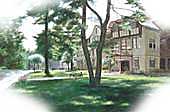Fall
1984
From Death to Resurrection
Jack Groblewski
Pastor in Bethlehem PA
“Say nothing until the Son of Man is risen in you.
Oswald Chambers
Much truth has been recovered recently regarding the Cross
and its pervasive work in the life of a true disciple. Jesus,
during His earthly walk, saw His ministry charged with the
working principle of the Cross. His ministry came to its fullest
revelation as He was caught up in Glory in the Mount of Transfiguration
(Luke 9:29), but even here it was necessary for Him to allude
to the work of the Cross in His life.
Satan has leveled his guns on the precious working of the
Cross in the life of the believer. He uses false doctrines,
teachings and various excesses to mitigate this truth and
cause us to seek some easier Kingdom of God. But there is
encouragement in knowing that apart from all the religious
din and clamor of our day, the Lord continues to bring forth
a people who desire to hear His truth and know His voice.
With this same urging of the Spirit that drew Jesus and His
disciples to Jerusalem, the Lord leads us in the forming of
His image and purpose in our lives through the fullness of
the power of the Cross. This is the same power of the Cross
that Paul knew: “That we may know Him, and the power
of His resurrection, and the fellowship of His sufferings
. . .” (Phil. 3:10).
This is for the disciple who understands that he must die
to his “self” life and that he must allow Christ
to bring him from life to death to life again. The integrity
of the Cross is not just the perpetuation of death. For a
disciple of Jesus, resurrection life eventually must become
unmistakably his possession. After Jesus came forth from the
grave, He persistently came into their presence until they
all knew that He lived (John 20:28). As surely as alpha begets
omega, those who thoroughly embrace the notion that sin must
be crucified through identity with the Cross, will live again
and know a quality of life they never knew existed before.
When Jesus descended from the Mount of Transfiguration with
Peter, James and John, He had already begun to underscore
for them the truth of where He was going and what He had to
do. But in all of His teachings concerning His upcoming death,
He never told them about the Cross apart from the resurrection.
At the Mount of Transfiguration there was a foretaste of what
was to come when they saw the manifest glory of God as Jesus
was unveiled in their midst. But Jesus warned them “.
. . that they should tell no man what things they had seen,
till the Son of Man were risen from the dead,” (Mark
9:9). He did not want them to go forth and testify to a perception
of the truth of God which was not yet formed in their lives.
Jesus knew as He set His face like a flint toward Jerusalem,
that there was to be more dying there than His own. Each apostle’s
conviction, and love for his Lord would be shaken to the bone.
When Jesus carried the apostle’s sins to the Cross,
He also carried every ambition they had for the kingdom, and
all these dreams died with Him.
In spite of the many times Jesus had taught His disciples
concerning His death and resurrection, His death seemed to
be a disaster to them. Later, when He presented the disciples
with resurrection they still found it difficult to believe
that He was not dead, along with the promise, vision and the
will of God for their lives. Now these things were raised
up with Him into a new realm. They were formed in the lives
of the disciples and ultimately culminated in a manner beyond
their wildest dreams. Only fifty short days beyond the time
of death and despair, they began doing what their master had
done. Now, they could begin to tell men “what things
they had seen” with authority, for “the things
they had seen” were now formed in them. They were no
longer enamored with a memory, or a theory. They could testify
to the resurrection life that was now within them.
When Jesus was raised from the dead to resurrection life,
the life that came with Him was different than the life which
went with Him to the Cross. A whole new order of living became
a reality—a life as different from the old as the seed
is from the tree (I Cor. 15:37). The subtlety of resurrection
life is that flesh does not recognize it. This is because
it is glorified life, and flesh does not recognize the glory
of God.
On resurrection morning we find Mary Magdalene at the empty
tomb; inconsolable and empty. Jesus’ body is gone; her
companions and the disciples have left her in wonderment and
disillusionment. Even two angels cannot seem to shake her
from the apparent circumstance. Mary would have been satisfied
with a corpse, with the shell of what once was, with the dead
vestiges of the glory (John 20:15). In her faithfulness to
what had been, she could not peer into the glory that was
now set before her. But mercifully, the Shepherd called her
name and in a moment, in a flash of warmth and revelation,
she recognized Resurrection Life.
At first it is difficult to recognize resurrection life.
It may even seem more like death. Crucifixion is public, but
resurrection is private, emerging from the loneliness of a
tomb. But we can say this: the gift of the revelation of new
life is given to those who have nothing left of themselves
to loose. It is given to those who would simply know His voice
anywhere, in any circumstance. There may have been those at
the empty tomb who knew Jesus “better,” knew Him
longer, or knew more about Him. But Mary knew His voice.
God is forming a people who are no longer “astonished”
at the tombs of their lives (Luke 24:12), or muddled somewhere
between death and life. May we, by His grace, be a people
who, having the death of Christ applied to our experience,
come forth, “in the likeness of His resurrection”
(Rom. 6:5). May our death with Christ lead us on to resurrection
life with Him.


